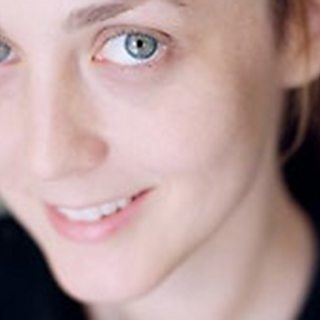Uncle stars Nick Helm as an out-of-work musician who forges an unlikely alliance with his 15-year-old nephew.
We spoke to Lilah Vandenburgh about her writing career, working with co-writer Oliver Refson, their writing process and Uncle's development and evolution, including loads of useful advice.
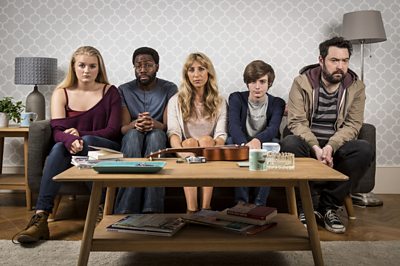
Can you tell us about your background as a writer?
I come from a family of writers and was a big reader as a kid, especially of fantasy, sci-fi and comics, and an obsessive TV and film watcher. I wrote sketch comedy, prose, and did musical theatre and playwriting in my teens and ran a theatre troupe with a group of friends in Dallas, Texas. I got undergrad and grad film degrees and dreamed of pursuing feature directing. But after writing and directing a short, BITCH, which did well on the festival circuit, I fell into promo directing and got a bit off track with features.
It was partly out of access and necessity I think, and partly not knowing myself well enough, that I’d been persuing a career in writing more indie, naturalistic drama which I didn’t really enjoy. Then when the financial crisis hit, and promo work began to dry up, I did a lot of comfort viewing. I rewatched things like Buffy and various Star Trek incarnations, anime, and devoured YA novels, comics and fanfic, and had the epiphany that what I cared most about was genre storytelling.
So I made a conscious decision to focus more on genre and write for pleasure, in a more fannish mode, and worry less about whether people thought my material was worthy or “grown up.” And I think my writing became more genuine and actually, more mature as a result.
I think there’s a lot to be said for structure, especially in genre, and I’m always looking to deepen my understanding of story beats and how to utilize tropes. I think tropes are great by the way! My writing partner, Oliver Refson, writes in a more contemporary, naturalistic style and that intersection of his naturalism and my genre sensibility is how you get Uncle.
When did you first start writing with Oliver Refson, was it specifically for Uncle?
Oli and I met at grad film school and have been writing together off and on for over a decade. We’d collaborated on several comedy screenplays over the years, but Uncle was our first joint TV project. He came up with the initial concept, there’s a hint of the autobiographical in there, and did the first draft of the pilot. I came on in the rewrite of the pilot and we’ve been writing the show together ever since. It ceased to be autobiographical pretty early on and the concept really expanded. My background in music helped open up the music storylines we explore and knowing both Nick and Elliot are musicians, as well as much of the supporting cast, gave us the freedom to push the show in that direction even more.
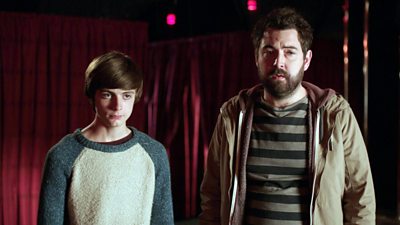
How does it work writing as a partnership? Do you think it works particularly well for comedy?
YES! I think that’s why there’s so many good comedy double acts. If a joke makes us both laugh, it’s much more likely to make the cut and we’ve developed a shared sense of banter over the years.
We come up with a story concept together and try to have a theme that all the characters are working towards in the episode. Whether that’s a subject like “losing/gaining sex appeal” or “priorities” or whether it’s more of a moral lesson, we boil it down to its simplest version and make sure A, B, and sometimes C plots, are connected in some way. Ideally, if there’s a song in that episode, we want that to relate as well.
It’s a very American way of working, and helps gives us a framework for an episode. We used to be more chaotic with ploughing into a first draft when the idea was half-cooked and then reworking it, which sometimes required multiple page-one rewrites. Now we break stories properly and outline the beats on a whiteboard before we start and it’s a lot faster. This is the difference between writing episode 1 and episode 20!
Someone usually writes the first draft, then we swap drafts back and forth, typically we each do two full drafts a piece with a lot of discussion along the way, and come together at the end for a read-through out loud (doing the characters) and an edit pass, cut-down, and joke punch-up that we do together. We then submit for executive notes, followed by channel notes, which both involve rounds of that edit/punch-up/cut-down again.
We like a pacey show and the ability to cut out air or bits that don’t work, so we purposely write a little long (a typical 28-29 minute ep will be 34-36 A4 pages). The fact Oli and I direct the series helps, because we have a strong idea of how want it to sound and if it doesn’t work, we can cut it in the edit.
We’re really tough on ourselves about theme, structure and joke construction. We’ll argue over a word in a sentence or the sound of a new character’s names. We both have hills we’ll die on.
We do think there’s a good deal of craft to writing a sitcom or comedy drama. And over time you could say we’ve developed a bit of a dogma about it. We abide by rule of three, but often do rule of two, and there’s one running gag in Uncle Series Three that we do, seriously, I think 12 times. We just do it to the point where it’s not funny at all, and then hopefully comes back round to being funny again. We just drove that joke into the ground for our own amusement.
What was the origin of the idea for Uncle? Is it based on a real-life situation or anyone you know?
Oli was living in New York while his siblings had kids and by the time he’d moved back to London, he realized he really didn’t know any of his nieces or nephews very well. So the concept of the show is, “What if this inappropriate uncle and uptight nephew were vaguely aware of each other’s existence but had no meaningful relationship?” And the show begins the day that relationship begins. Oli’s obviously not the irresponsible, hot mess that Andy is, but that makes for much better comedy and drama - we think.
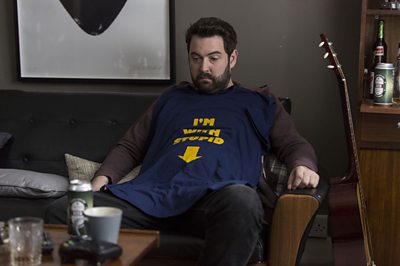
Can you describe the development process for Uncle?
Oli sent the script to his agent—who instead of giving notes, sent it out immediately. Within a few days about five production companies were interested. We went with Baby Cow who shared our vision for the show. All the channels passed at that point and we thought it was dead. A year went by and our exec producer, Henry Normal, had the idea to see if Nick Helm wanted to attach. Nick responded to the material and that got the interest of Shane Allen at Channel 4 who had commissioned The Inbetweeners. Uncle’s first pilot was part of the C4 4Funnies scheme and got a good response. But Shane left Channel 4 shortly thereafter and none of the 4Funnies got commissioned. So it was dead again.
Months went by. Shane became head of comedy at the BBC and we were asked if we’d like to take Uncle over to BBC Three. Which seemed like a great fit. But the original format was a commercial 22 minutes and BBC Three needed around 28 minutes.
So we re-wrote and re-filmed the pilot (Nick’s hair had changed tremendously and Elliot had already grown) and added some scenes and changed some casting.
In retrospect, we can’t imagine going back to the shorter commercial length, as the added time gives us the chance to explore more dramatic themes and play with pacing.
How would you describe the tone of the show?
There’s this new term “sad-com” floating about and we get compared to other things tonally in this space. We coined the term “Melanchomedy” to describe the pilot and we like that one too. Comedy drama also works. We want the comedy highs high, but for there to also be pathos and real sadness. And real consequences for a character’s actions. It really comes to a head in Series Three actually.
There’s a meditative, tragic undertone to a lot of Uncle. Andy is a depressive, the show starts with a suicide attempt, and we address mental health, addiction and dysfunctional family dynamics in multiple ways, both comedic and dramatic, over the course of the show. We often ask ourselves as writers, “How absolutely heartbreaking can we make this and still technically count as a sitcom?”
Who writes the musical numbers?
Nick Helm writes the songs for the show, which are produced and arranged by Andy Jones. Additionally, composer Matt Simpson, aka Segal, does our score.
Usually we give Nick a prompt in the script, typically just a song title and the genre, with how it needs to fit in thematically with the episode and he takes it from there. I directed all but one of the videos, save one done by Oli, and Oli directs all Nick’s live/concert style performances in the show, so we have a good sense of what we want visually out of the song ahead of time.
I love all Nick’s songs, but I think he’s really outdone himself in Series Three.
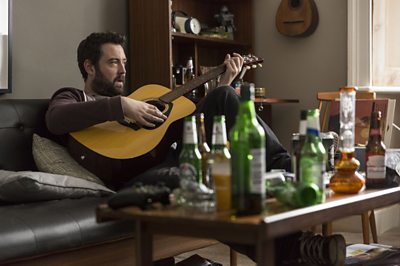
How do you make a character that could be unlikeable sympathetic to the audience?
OOh, We talk about this A LOT. I personally think the trick to a sympathetic anti-hero is down to POV and subjectivity. It goes a little bit back to the dogma I was referring to earlier. If you cleave quite strongly to the subjective viewpoint of your character, they can behave badly and the audience will still be forced to identify with them, through their eyes. We’re complicit in that character’s actions and often root for them, even if what they’re after isn’t a thing they should get. Not only is Andy pretty badly behaved, but Errol can be quite manipulative and passive aggressive as well, even though he acts as Andy’s conscience.
Anti-heroes are popular at the moment, so on the scale of amoral protagonists, Andy’s not even that bad. He at least makes an attempt to make moral decisions and gradually, through the course of three series, he’s actually had some growth. Having the subjective fantasies of the music videos further gets you into Andy’s headspace, his rich imagination, which gives a window into his soul, and maybe mitigates some of the more awful things he does and says.
More than anything, I think Nick Helm’s natural charisma and innate sympathetic quality does a lot of heavy-lifting on the likability front.
Do you have particular actors in mind for characters when you write?
We do for some characters and not for others. Daniel Lawrence Taylor was our dream Bruce; we knew his work from Ginger and Black.
We didn’t write the leads with Nick, Daisy or Elliot in mind. We had to see them to know they were right and they all had such great chemistry with each other. But they inhabit those characters like a glove and over time have helped shape the voices of the characters. After three series, we write much more for the individual actors now because we can hear their voices in our heads.
Sometimes we’ve just had a bit of casting luck. Our executive producer, Ali MacPhail, suggested Dylan Moran for the character Marsh this series. We hadn’t had him in mind but now can’t imagine anyone else inhabiting that part. He’s wonderful.
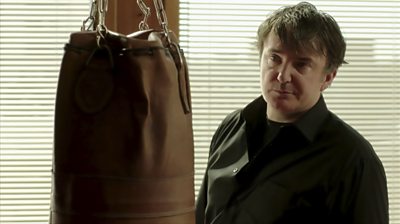
How has Uncle evolved over the 3 series? What is new for Series 3?
Well, both Andy and Errol have grown up a bit and we wanted their journeys to parallel. As Errol becomes an adolescent, Andy becomes a madolescent and they explore that space together. Errol, now a proper teenage boy, is getting more into the idea of girls and romance and Andy is looking to deepen his friendships with women, something he was told he wasn’t capable of in series 2, and he’s looking to stop screwing up his music career.
Also, everyone lives together under one roof now, which makes for some interesting family dynamics. I don’t want to spoil too much but we’ve also got some really cool music videos, including an animation, great guest cameos, some old faves are back, and there’s - a fantasy episode!
Do you think the show has changed at all with BBC Three going online?
It’s exciting what’s going on in TV at the moment. VOD platforms and more online commissioning has opened up storytelling opportunities and pushed the form forward.
But we’ve actually made a conscious attempt to have it feel the same as it did on terrestrial TV. We’re aware people watch Uncle in a lot of different formats. On repeats, on Catch Up and BBC iPlayer, as well as iTunes, DVDs and VoD channels in other countries. We want something that works in both digital, online formats and on your standard TV as well. We also hope, if you binge all three series, that thematically and tonally you feel it all hangs together (you might even start to notice a lot of Easter Eggs).
What’s the most useful advice you’ve been given as a writer?
Don’t be afraid to let your first draft be bad. A lot of writers are afraid to do what we call a “vomit draft.” Just heave it all onto the page and don’t worry about editing yet. It’s really difficult to think as an editor and idea generator at the same time; they’re at odds. And writers can get too hung up on perfecting every word from the start. No, fill the page. You won’t have anything to edit until you put it down. And you can perfect it in later drafts.
Also, a writing habit is great, but don’t kick yourself if you’re not a “write every day” type. Some people just can’t manage, whether it’s because of work, kids, or health or emotional challenges. Just find a rhythm that works for you.
What are your 3 Desert Island DVDs?
If we’re talking TV series, I’m doing boxsets and I’m going to be extra cheeky and count all the different Star Trek series as one show. I think my others would be Buffy and either The Wire, BSG, Avatar: The Last Airbender, or Veronica Mars. That was very cheeky. Definitely more than three.
Watch Uncle on BBC Three and on BBC One TV
